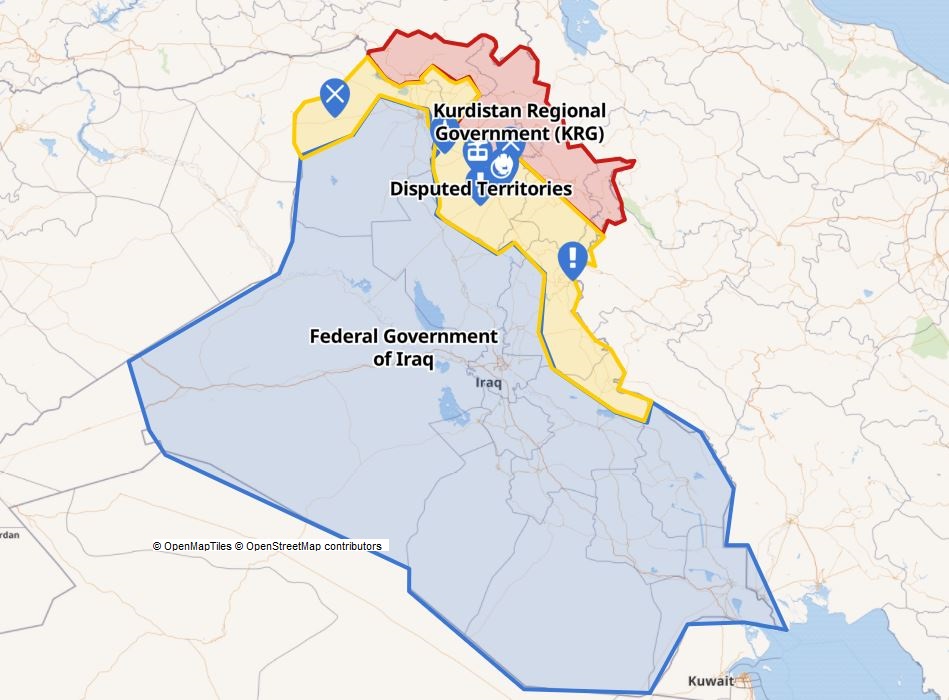1.7K
Kirkuk
- On Wednesday night, an unknown assailant attacked a Kurdish lawmaker’s office in Kirkuk’s Rahimawa neighborhood. The newly elected lawmaker, Shakhawan Abdullah, announced that no one was injured during the attack but there was property damage. Abdullah is a member of the Kurdistan Democratic Party (KDP).
- On Thursday, January 13th, the Iranian-backed Popular Mobilization Units (PMU) held a commemoration ceremony for the Iranian general Qassim Solemani and his Iraqi proxies, killed by the US airstrike in 2019. During the ceremony, the Turkish-backed lawmaker Arshad al Salehi called for “expulsion” of the Kurdistan Workers’ Party (PKK) in Iraq, in a similar call by Turkish officials. On the contrary, a Shia leader of the State of Law Coalition, Haider al Lami, accused Turkey of “stirring up strife” in Iraq and spreading “racist slogans” that Kirkuk is “Turkish and will remain Turkish.” al Lami called upon the caretaker Prime Minister Mustafa al Kadhimi to obligate Turkey to “Respect the sovereignty of Iraq and its people.”
- In a statement, the Police Department to Combat Narcotics and psychotropic substances announced the arrest of four drug dealers on Sunday, January 17th. On Saturday, January 16th, the police also announced the death of a wanted drug dealer and the arrest of another accompanying him after a deadly clash with police near the Taqtaq district. Fire exchange occurred when one of the drug dealers refused to surrender to the police. Two and a half kilos of “Narcotics” were confiscated. Dozens of drug dealers have been arrested or killed in Kirkuk since October 16th, 2017, as Kirkuk became the main route of drug trafficking.
- Iraq’s oil minister fired the head of Kirkuk’s oil and gas distribution department after alleged corruption. Kirkuk faces a severe shortage of fuel, and the recent change aims to decrease the smuggling of oil and gas. Hussien Talib Ab has replaced the former head Mohammed Faiq Aref.
- Due to an increase of the Covid-19 variant, Omicron, Kirkuk’s administration decreased working hours by 50% after the province recorded the highest rate of cases in the country.
- After an explosion in the Ceyhan pipeline near Turkey’s Kahramanmaraş, exports were halted the for hours. Though a PKK offshoot claimed an attack on the pipeline, Turkish officials said it was a “power pylon and not an attack.” The state-owned BOTAŞ oil pipe company said it resolved the issue without further elaboration.
- Arab opinion board leader Nazem al Shamari joined the Turkish-backed Turkmen Front and the Arab Coalition in calling for provisional elections in the province to determine a new governor. Non-Kurdish parties in Kirkuk pressure major election winners in Baghdad to not include negotiations with Kurds over selecting a new Kurdish governor, a demand Kurds have raised despite not having a candidate.
Khanaqin
- Iraq’s electricity ministry decreased Khanaqin’s share of national power to five hours per day, raising anger among the public. Due to the freezing cold conditions, the ministry said the demand had risen dramatically, but locals complain about Khanaqin facing a shortage of electricity and water during hot summer days.
- Iraq’s interior ministry announced the capture of a group of six drug dealers on January 14th. The ministry said the group marketed itself more as weapon traders, but they were dealing drugs instead.
Makhmour
- A US-led coalition struck several ISIS (Da’esh) positions in the Qara Chokh mountain, where the terror group has been active.
Shingal (Sinjar)
- Tensions rose between the Sinjar Resistance Units (YBS) and the Iraqi army after the latter removed a statue of YBS commander Zardast Shingal, who was killed in a Turkish airstrike last year. The YBS threatened the Iraqi military with action if the statue did not return. In response, the Iraqi army launched an arrest campaign in the town. Both forces deployed in the city and the governor of Nineveh called for de-escalation.
.

